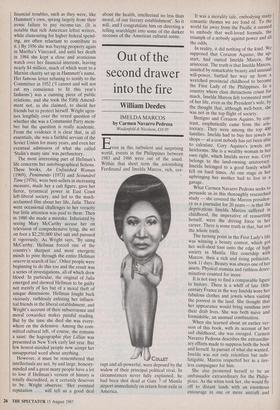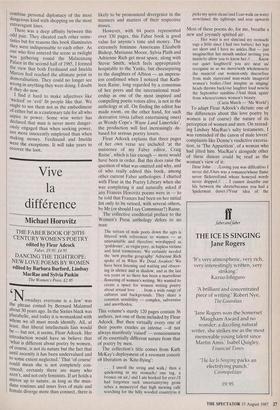Out of the second drawer into the fire
William Deedes
IMELDA MARCOS by Carmen Navarro Pedrosa
Weidenfeld & Nicolson, £10.95
Even in this turbulent and surprising world, events in the Philippines between 1983 and 1986 were out of the usual. Within that short term the astonishing Ferdinand and Imelda Marcos, rich, cor-
rupt and all-powerful, were deposed by the widow of their principal political rival. In circumstances never fully explained, he had been shot dead at Gate 7 of Manila airport immediately on return from exile in America. It was a morality tale, embodying many romantic themes we are fond of. To the world far away from the Pacific it seemed to embody that well-loved formula, the triumph of a nobody against power and all the odds.
In reality, it did nothing of the kind. We supposed that Corazon Aquino, the up- start, had ousted Imelda Marcos, the aristocrat. The truth is that Imelda Marcos, assisted by remarkable beauty and unusual will-power, battled her way up from a wretched provincial childhood to become the First Lady of the Philippines. In a country where class distinctions count for much, Imelda Marcos felt tormented most of her life, even as the President's wife, by the thought that, although well-born, she was not in the top flight of society.
Benigno and Corazon Aquino, by con- trast, emphatically came from the ans- tocracy. They were among the top 400 families. Imelda had to buy her jewels M shops — at a cost nobody has yet been able to calculate. Cory Aquino's jewels are heirlooms. She is a wealthy woman in her own right, which Imelda never was. Cory belongs to the land-owning aristocracy. Imelda belonged to a good family which fell on hard times. At one stage in her upbringing her mother had to live in a garage.
What Carmen Navarro Pedrosa seeks to persuade us in this thoroughly researched study — she covered the Marcos presiden- cy as a journalist for 20 years — is that the deprivations Imelda Marcos suffered in childhood, the imperative of reasserting herself, were the driving force in her career. There is some truth in that, but not the whole truth.
The turning point in the First Lady's life was winning a beauty contest, which got her well-shod foot onto the edge of high society in Manila. Her courtship with Marcos, then a rich and rising politician, took 11 days. Beauty was always one of her assets. Physical stamina and ruthless deter- mination counted for more.
It is not easy to find a comparable figure in history. There is a whiff of late 18th- century France in the way Imelda wore her fabulous clothes and jewels when visiting the poorest in the land. She thought that her appearance would bring sunshine into their drab lives. She was both naive and formidable, an unusual combination.
When she learned about an earlier ver- sion of this book, with its account of her sad childhood, she was enraged. Carmen Navarro Pedrosa describes the extraordin- ary efforts made to suppress both the book and herself. In pursuit of what she wanted, Imelda was not only relentless but inde- fatigable. Marcos respected her as a tire- less campaigner for him.
She also promoted herself to be an ambassador extraordinary for the Philip- pines. As the whim took her, she would fly off to distant lands with an enormous entourage in one or more aircraft and combine personal diplomacy of the most dangerous kind with shopping on the most extravagant lines.
There was a deep affinity between this odd pair. They cheated each other some- times but for reasons this book illuminates they were indispensable to each other. As one who first entered the scene as twilight was gathering round the Malacanang Palace in the second half of 1985, I formed the view that both Ferdinand and Imelda Marcos had reached the ultimate point in demoralisation. They could no longer see wrong in anything they were doing. I doubt if they do now.
I find it hard to make adjectives like wicked' or 'evil' fit people like that. We ought to see them not as the embodiment of either but as a cautionary tale for all who aspire to power. Some wise writer has declared that man is never more danger- ously engaged than when seeking power, nor more innocently employed than when making money. Ferdinand and Imelda were the exceptions. It will take years to recover the loot.



















































 Previous page
Previous page